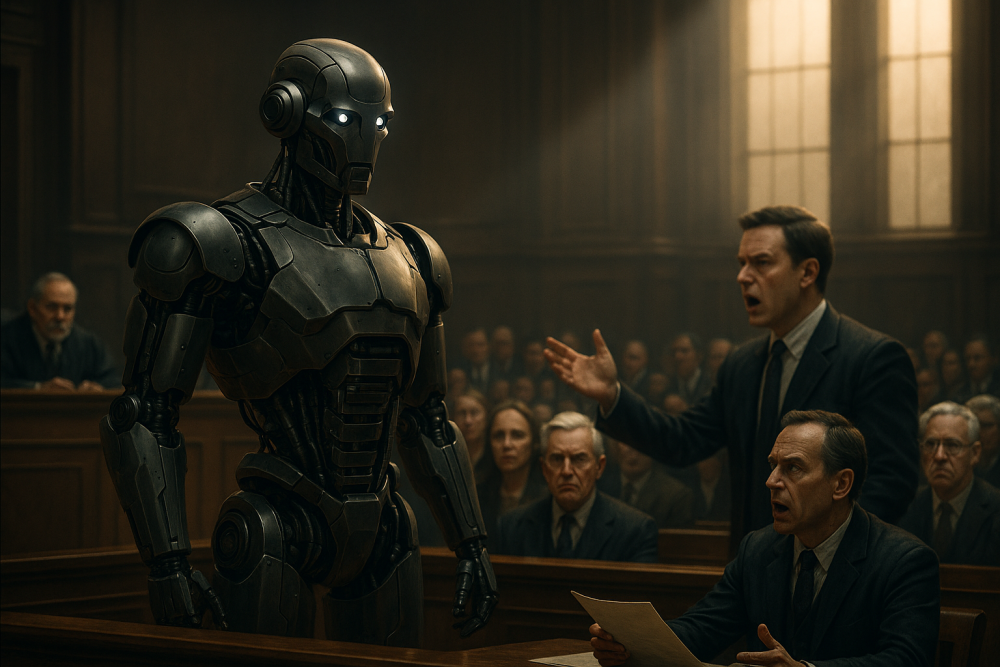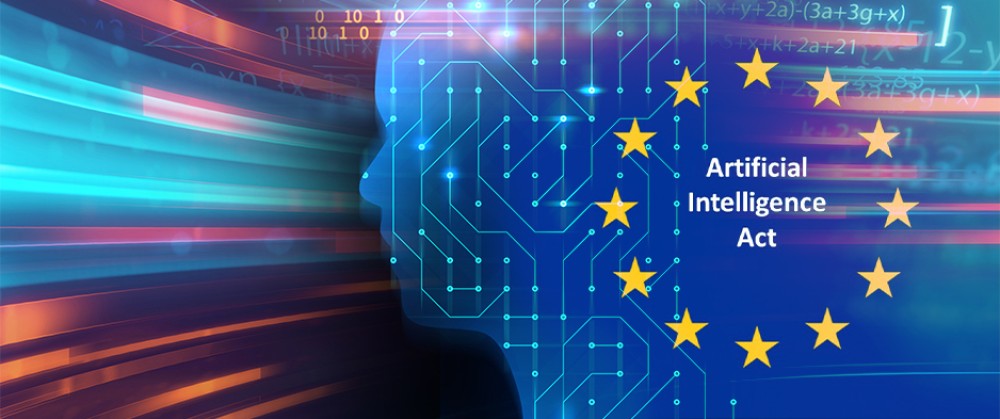OSMAN GAZI GÜÇLÜTÜRK INTERVIEW
Team: How do you interpret the place of content produced with artificial intelligence within the scope of the Law No. 5846 on Intellectual and Artistic Works?
Osman Gazi Güçlütürk: There is one fundamental issue here: The Law on Intellectual and Artistic Works actually protects the intellectual work, protects its reputation. Here, a binary distinction is made between ‘expression’ and ‘idea’; it does not protect the idea. The idea is not protected, one cannot claim to monologue on the idea, expression is protected. Why am I making such a distinction in the first place? For example, you enter commands, you enter prompts into those algorithms that produce images. I can say, ‘Draw me a house with pink shutters at the top of a mountain in a snowy environment. In fact, there are an unlimited number of possibilities that fit this description. It will pick 4 of them and bring them to me. Now if I say ‘I entered the prompt, I have the right to do this’. Then I am actually claiming the right on all the pictures that the prompt will bring out. Does this seem right? Question mark. I'll leave it here for now. At the core of the origin is the concept of work, and we say something like this: We call all kinds of products that reflect the particularity of the owner and that are included in these, these, these categories, and we actually examine them under 3-4 headings. The most important issue here is speciality. The concept of speciality in our country is actually identified with originality and creativity abroad. That is why it is a little different in our country. Turkish Law is not equal to foreign law in this regard. Now the question comes to this: Has the producer added a part of himself/herself to a product produced using artificial intelligence, a part that will fulfil this particularity requirement? The answer to this question is ‘It depends on the situation’, but how does it change? Let me explain by giving an example: If I only produce by pressing a button, I think I no longer add my speciality here. In my opinion, I should no longer be able to claim rights on what is finally produced there, but let's say I used such a prompt thing and wrote such a generic thing, it gave 4 pictures. I used one of them and I said, ‘I used this, I wrote it and it produced what I wanted.’ So I wanted to say, ‘This is mine.’ Did it work? I think it didn't happen again, because he showed me only four stages among many shapes, and I chose one of them, but I didn't do the final production of it. The idea was mine, I didn't translate that idea into performance, but I took that picture; I changed it for the fourth time, the fifth time; I improved it again, I said, ‘Do it like this,’ and I added one or two more retouches on top of it by hand, and I can say, ‘Well, there should be speciality here.’ The question here is, at the end of the day, it comes to this: -5846's core concept is “speciality” in terms of the work- how do I use artificial intelligence? How much do I contribute to the transformation of that thing we call an idea into a product, and where does artificial intelligence fit in? Is it no different from pressing a button on a camera? I mean, I have determined everything, does it only give me the result? Because we call it an artefact. In fact, pressing a button is also a mechanical device, is it similar to this? Or no, I only gave the idea, did he actually do everything? This is a very controversial issue, of course, in detail. A separate path has been taken in America, the European Union is doing other things. We will see the full development in time, but I think the core concept under the current regulation is the following: ‘Is there speciality or not?’ examination. It is necessary to look according to the situation. In most cases, if you just enter prompt and press enter, it is easier to say that they will not be artefacts.

Team: Thank you. Our other question is as follows: How do you evaluate the impact of blockchain technology on the protection of personal data? Can applications such as GDPR be applied on blockchain?
Osman Gazi Güçlütürk: Let me clarify the question ‘Can applications such as GDPR be applied to blockchain?’ as follows: It is already applicable. The problem is how to make it applicable because if you are processing personal data, the technology you use does not matter. GDPR in Europe, KVKK in Turkey, or even GDPR in Turkey if you are processing European data, depending on the situation. The main issue is how this application will be, and if you are directly uploading the data to the blockchain, whether this violates some principles, some principles. Now again, there are a few basic issues that I need to put forward. When we say blockchain, we always understand this: There is a special type we call Public Permissionless: It is open to everyone's access and everyone can compete to register, bitcoin-like. In fact, it is not limited to these, but I will talk about them, because the discussion comes from there. In fact, the blockchain is not uniform, we need to clarify that first, so due to the nature of the blockchain, some are not open to everyone, some are not records that everyone can write. The answers vary for them, but if we talk about the open bitcoin-like ones, the biggest problem there is this: When you save a data there, since that data is spread to I don't know how many devices at the same time and it always stays there unless everyone decides to close this system, it actually fulfils the situation in Article 7 of the KVKK. The answers vary, but if we talk about bitcoin-like open ones, the biggest problem there is this: When you save a data there, because that data is spread to I don't know how many devices at the same time and because it stays there unless everyone decides to close this system, you actually fail to fulfill the situation in ours, in Article 7 of the KVKK: deletion, anonymization, destruction, which we generalize as destruction. You fail to fulfill the destruction situation, even if your purpose is achieved or the use is over, the data remains there and remains readable if you have not saved it correctly, so you need to be careful. It is applied as a rule, if you ask how we can do it in a way that will be careful or, for example, in the EU, in a way that complies with the right to be forgotten, there is one basic method for this: There is a feature called off-chain storage. You actually keep the data on an off-chain server, on the server in the traditional sense, you only copy its digital footprint onto the blockchain, so that footprint also has a connection to the server where the data is stored. What we call a digital footprint will always remain there, you will not be able to delete it either, but if you want to delete it, if you want to use this right, you will go, you will remove that file from that server, so it will become inaccessible. You will have effectively destroyed it, the link will seem to be there, but it will be effectively destroyed. You can largely overcome this problem by keeping personal data, sensitive data, data with commercial value - the issue is not only related to KVKK - somewhere else with offchain storage and actually storing their records and only their digital traces on the blockchain, but of course, you need to look at the characteristics of each situation again because, for example, special techniques can be used for the mechanisms inside the blockchain in addition to its own structure. Without this, there are things we call P2: Privacy Enhancing Technologies. This actually comes up more in artificial intelligence, but there were Privacy Enchanting Blockchains that used different structures. You can take some additional precautions directly in terms of structure and still make yourself secure, but the strictest, cleanest way is to keep this data from the outside without putting it on the chain, only add its key and connection there, and if you are done, delete it from that server and continue.
Team: Thank you. Professor, in your blog post titled “Is Artificial Intelligence Status Quo?” you state that the answers of artificial intelligence vary depending on the language. How can this situation be controlled and punished in the context of the crime of Hate and Discrimination in TCK Article 122?
Osman Gazi Güçlütürk: Good question, I am very cautious since it is a criminal question. I will say a very superficial “No” on paper and move on because I do not like to get involved in the principles of Criminal Law as a private lawyer. There is a possibility that I may say something wrong, but the reason why I feel comfortable saying no is as follows: First of all, the moral element of the crime will not be apparent to a very high extent because the issue there is actually you enter the prompt and you enter without foreseeing the outcome. When you enter without foreseeing the outcome, the fact that the output that comes has a content that could constitute a crime in that way -at first glance- will not bring you to a point related to the crime anyway since you cannot foresee the outcome due to the disconnection between you, but whether the change of that content or language-based discrimination alone is likely to constitute a crime, in other words, would it occur if a person did it knowingly? I think his answer is no because the differences there are cultural, in other words, in the sense of Criminal Law or the Constitution (in the context of fundamental rights) there is no discrimination in most cases. There -after all, what we call artificial intelligence does not drop it from the sky, it draws it from data sources- the data sources have a rhetoric depending on the language they are used in and the geography they come from. Depending on that, the type of output inevitably changes. When you talk about Turkey, it tries to do it because it comes from sources closer to Turkish culture, when you take it directly from English, you hear a more global context. The examples there were good, the question seemed like that to me about it anyway: For example, the death toll in the Gaza incidents is different in Israeli sources, different in Palestinian sources, so no matter which language you ask the question in or have it translated into, it can draw its source, so there are differences in the numbers. There is a similar situation for Turkey. There are similar situations in the death toll in Turkey's conflicts with the PKK, but this is not discrimination for the sake of discrimination. It is due to the different reflection of the sources. I'm going back to what I said off the record when I was talking to you at the beginning: If you know how artificial intelligence works, you can understand these things.
Artificial intelligence (AI), to put it in extremely simplified terms—though writing it this way would invite many objections, I say it only for the sake of explanation—functions like a highly technological parrot that analyzes the connections in existing linguistic data sources and reproduces elements accordingly. It essentially reflects and translates the content found in its sources. The variation in data sources is reflected in AI outputs, and the insufficient representation of certain languages also plays a role. Since there is an abundance of English-language sources, whereas Turkish-language sources are significantly fewer, the quality of Turkish-language outputs inevitably suffers. In English, one can access information more seamlessly, as both the diversity of sources and the representation of the language differ. This is an automatic and objective consequence of the system, which is why such issues should not be framed as faults; they are not entirely foreseeable in this context.
Team: How do you assess the current legal regulations regarding AI and data use in Turkey? What amendments do you think are necessary?
Osman Gazi Güçlütürk: That is a great question. First, I want to address a common misconception that I enjoy critiquing: the claim that "there is no legal regulation applicable to artificial intelligence in Turkey." Even some scholars make this assertion, but it is incorrect. While Turkey does not have specific legislation dedicated solely to AI, existing legal frameworks such as the Personal Data Protection Law (KVKK), the Intellectual Property Law (FSEK), the Constitution, the Code of Obligations, and the Turkish Penal Code (TCK) apply to AI where relevant.
This is similar to what I mentioned about blockchain: If AI is used to process personal data, then KVKK applies. The regulatory landscape is currently fragmented, and some aspects will remain that way because these are fundamental laws. Understanding AI’s legal framework requires familiarity with data protection (KVKK), intellectual property, and fundamental rights issues such as discrimination.
Regarding sector-specific regulations, we might expect a Turkish version of the European Union’s Artificial Intelligence Act. However, calling this an "AI law" is misleading. The European Commission used that term for marketing purposes, but it is essentially a product safety regulation. It establishes the conditions under which AI systems entering the EU market—whether from external sources or within the region—must meet certain safety standards. It does not regulate fundamental rights comprehensively, nor does it address copyright, data protection (GDPR), or liability concerns.
Given Turkey's membership in the EU Customs Union, the country must align its regulations with EU standards to ensure the smooth continuation of trade. This means Turkey will likely implement an AI-related product safety framework. Additionally, there are other EU regulations such as the Data Act and GDPR-related frameworks. Currently, Turkey lacks a general legal framework governing data ownership. KVKK addresses personal data, FSEK covers data classified as intellectual property, and sui generis database protection exists under FSEK. However, there is no overarching legislation on data ownership.
The European Data Act, which regulates ownership rights over data generated by smart devices, is an example of a new regulatory development that could influence Turkey’s legal landscape. Due to Turkey’s trade relationship with the EU, similar regulations may emerge here. However, it is premature to claim that a single approach must be adopted. AI is a rapidly evolving field, and overly hasty or uncontrolled regulation can create unintended consequences. Therefore, rather than rushing into legislative action, AI-related legal frameworks should be carefully observed and developed gradually over time.

Team: Given the high costs of modifying blockchain data, could governments avoid these expenses? How can individuals ensure accuracy and control over incorrect data entries?
Osman Gazi Güçlütürk: The high cost of data modification applies mainly to public permissionless blockchains, which governments typically do not use. Governments rarely relinquish control over their data sources unless there is a highly specific purpose. Allowing uncontrolled data flow contradicts state sovereignty principles. Thus, if a government were to use blockchain infrastructure, it would likely avoid permissionless models or introduce centralized control mechanisms.
Moreover, the efficiency of blockchain-based systems is currently quite low. When a large number of participants are involved, the system requires mechanisms to ensure order. This often means splitting data into small parts and transmitting only limited information. The solution to this issue is off-chain storage, where large or sensitive data is stored externally while only the reference information (hash) is stored on the blockchain. If another issue arises, how can we fix it? How can we maintain control? Again, off-chain storage. You’ll place it off-chain, and if a problem occurs, you’ll disconnect the link from there. By the way, I keep mentioning "off-chain," but there are variations of this, called "oracles"—intermediaries.
So, for example, if you build a system (especially useful in smart contract setups), and the contract initiates a data processing sequence that can't be stopped—this has happened before due to poorly written code—then you need to prevent such issues. To do that, you should always integrate an oracle somewhere or connect it to an external input. This way, with information coming from an oracle, the system can be halted, or a specific record processing can be stopped.
If you always leave an external gate open and avoid writing closed-loop, deterministic, endlessly running code just because you're overly confident, you won’t face these issues. However, many engineers do get excited and make such mistakes. Nothing much can be said to them.
Team: Sir, we have a question regarding this. Are off-chains linked to the master key in a centralized system like blockchains, or are they entirely independent?
Osman Gazi Güçlütürk: Think of our regular computer usage as off-chain storage. There’s a server—a remote server—connected to a computer. I store the data I need there, encrypt it, and do everything necessary. Then, I generate something called a hash that contains information about that data and put this hash on the blockchain. If I change the data, the hash becomes invalid, and the connection breaks.
Team: Thank you, sir. This makes more sense now because the data there couldn't be entirely separated before.
Osman Gazi Güçlütürk: I’m not completely modifying the data, but by breaking the connection, I eliminate security and immutability concerns. However, this leads to a lot of useless hashes piling up on the blockchain, which I can’t prevent.
Team: So, are oracles one of the main elements ensuring this security?
Osman Gazi Güçlütürk: Oracles also play a role in ensuring blockchain functionality. In smart contract systems, where operations can be automatically executed under predefined conditions, errors in initial coding have led to irreversible transactions. To prevent such issues, oracles act as external data sources that provide real-time information, enabling conditional execution of blockchain operations. For example, a contract could be programmed to terminate if the temperature in Adana reaches 55°C, with an oracle verifying the condition from a weather service. Similarly, external verification from legal experts, auditors, or other trusted sources can be integrated.

Team: Lastly, based on your academic career and experiences, what advice would you give to young lawyers and researchers?
Osman Gazi Güçlütürk: Good question. I have wandered a lot; lawyering, academia, abroad, domestic, industry, in-house, consultancy. At the end of the day, I am satisfied with where I have arrived. I tried different places, and when I decided I did not like them, I withdrew. Not everyone has the opportunity, but my cleanest advice would probably be this: This is a profession, this is a field, and at some point, you will likely make a marginal decision—anyone can—but as long as you are a legal professional, it is an area you will continue throughout your life, or at least define yourself with. You need to try to find an area you enjoy. Law faculties do not help much in finding that area. I generally recommend discovering what you like at an earlier stage through extracurricular activities, research, the knowledge you acquire, and reading. Whether you have an area you love or not, being able to focus on it early has many advantages.
But I will connect this to another point: Let’s say you entered a field, thought it was good, worked for one or two years, and then realized it was not for you. At the same time, I want to say that it is never too late to change fields and expertise—up to a certain point—I do not even think I have reached that point yet. At the end of the day, one should not be afraid of new things. In Turkey, law faculties have somewhat turned into vocational schools, as if we are only training lawyers and judges. That is not the case. It is a foundational science. It provides you with numerous concepts. You can transition from law to public administration, to international relations—these are already well-known paths. Judiciary, prosecution, and academia are also well-known paths, but beyond that, you can move into management, consultancy, or even suddenly become an artist or an engineer somewhere. The knowledge provided by law faculties has intrinsic value, so one should not fear thoughts like, "I have completed my legal internship, and now I must become a lawyer, or else my time will be wasted."
One must follow new things. There is always competition, there are always challenges, but in the end, law is something that continuously evolves with life. Some things we did not consider five years ago are now vast fields, or some fields that were huge five years ago no longer exist. That is why one must recognize and understand that this profession is dynamic, embrace it in that way, and be open to innovation, experimentation, and exploring what one enjoys or does not enjoy.
Once you find what you enjoy, I recommend specializing in it—meaning you have found it and are progressing. No one can be an expert in all areas, so when you identify something, I advise advancing in that field and continuously adding something new to yourself. It is not always visible; we all seem to see similar places—like the Istanbul and Ankara markets. I understand that in some fields, there is a slight necessity—for example, in the public sector, even those in Istanbul have to move to Ankara, or for some jobs, everyone has to go to Istanbul—but in reality, law is a profession needed everywhere. My general recommendation is to view the field outside of its molds, recognize it as a fundamental science, proceed accordingly, and explore new things.
